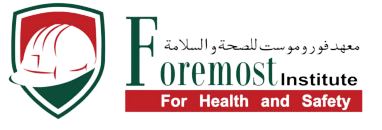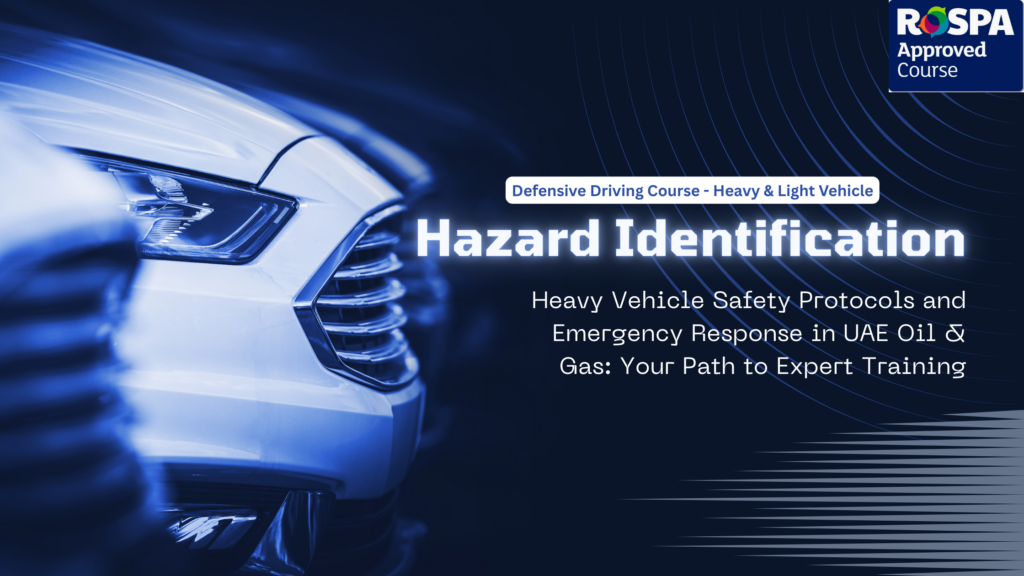Imagine a heavy truck loaded with materials, struggling to stay upright during a fierce sandstorm at an oil field in the UAE. This close call could have been a disaster, highlighting the inherent dangers associated with heavy vehicles in the UAE’s oil and gas industry. These vehicles are essential to operations but come with significant risks, especially when operating in harsh conditions such as extreme temperatures, sandstorms, and limited visibility. That’s why safety protocols and emergency response plans are more important than ever.
At Foremost, we offer ADNOC-approved and ROSPA-certified training, ensuring that you and your team are equipped to handle these hazards effectively. Read on to understand how we can help mitigate risks and prepare your team for any situation.
Identifying Hazards: A Crucial Step for Safety
The first step in ensuring safety in the oil and gas sector is identifying the hazards. Heavy vehicle operations, particularly in UAE’s challenging environment, come with specific risks that need addressing. Here are some of the most critical hazards:
Common Hazards of Heavy Vehicle Operations
- Blind Spots and Visibility Limitations: Large vehicles have significant blind spots, making it difficult for drivers to see smaller vehicles, workers, or obstacles.
- Vehicle Instability and Rollovers: Trucks with high centers of gravity are prone to tipping, especially on uneven terrain.
- Mechanical Failures: Brake failures, blown tires, or engine breakdowns can lead to accidents and delays.
- Load Shifting and Spillage: Improperly secured cargo can shift during transportation, causing the vehicle to lose control or spill hazardous materials.
Specific Hazards in UAE Oil & Gas Operations
- Flammable Materials Handling: Transporting chemicals and fuel increases the risk of fires and explosions.
- Confined Spaces and Tight Maneuvering Areas: Navigating through narrow spaces at oil and gas sites increases the likelihood of accidents.
- Extreme Weather Conditions: The UAE’s intense heat can lead to heat stress for drivers, while sandstorms can drastically reduce visibility.
- Proximity to Critical Infrastructure: Colliding with pipelines or infrastructure can cause disastrous leaks, fires, or environmental damage.
Hazard Identification Techniques: Prevention Starts Here
Identifying hazards early is essential to preventing accidents. Here’s how to spot risks before they escalate:
- Job Safety Analysis (JSA) and Task Hazard Analysis (THA): Detailed risk assessments should be carried out before every task.
- Regular Inspections and Audits: Routine site checks ensure safety protocols are in place and potential hazards are mitigated.
- Near-Miss Reporting: Investigating near-misses helps pinpoint weaknesses in procedures and allows for improvements.
Implementing Robust Safety Protocols: Preventive Measures
Once hazards are identified, it’s time to implement effective safety protocols. Foremost offers comprehensive training to help your team follow these life-saving procedures:
Pre-Operation Vehicle Checks
- Vehicle Inspection Checklists: Ensure that all critical components, such as brakes, lights, and tires, are in working order before starting operations.
- Regular Maintenance: Frequent checks of tire pressure, brake systems, and fluid levels are essential to preventing breakdowns and accidents.
Safe Driving Practices
- Speed Limits and Regulations: Adhering to speed limits and local traffic laws helps minimize the risk of accidents in tight or hazardous environments.
- Defensive Driving Techniques: Our training emphasizes how to react to unexpected situations, promoting safe driving habits.
- Load Securement: Ensuring cargo is properly secured is vital in preventing accidents due to load shifts.
Emergency Response Procedures: Be Prepared for the Worst
Even with the best safety practices in place, emergencies can still happen. Here’s how to respond effectively:
- First Response: Immediately assess the scene, secure the area, and contact emergency services.
- Spill Control and Containment: Deploy absorbent materials and report spills to environmental authorities to minimize harm.
- Evacuation Protocols: Know your evacuation routes and ensure all personnel are accounted for after an emergency.
Comprehensive Training: Foremost Leads the Way
The key to preventing accidents and responding to emergencies lies in well-trained personnel. Foremost stands out as the best provider of ADNOC-approved and ROSPA-certified safety training in the UAE. Our courses are designed to ensure your workforce is fully competent in heavy vehicle operations and emergency response.
Key Training Areas:
- Defensive Driving for Heavy Vehicles: Tailored courses to teach your drivers how to avoid accidents.
- Hazardous Materials Transportation: If your operations involve the transportation of dangerous substances, our specialized training is a must.
- First Aid and Emergency Response: Equip your team with life-saving skills in critical situations.
Certification and Competency Assessment
Our training programs include practical evaluations, knowledge assessments, and refresher courses to keep your team’s skills sharp and compliant with the latest regulations.
Ongoing Monitoring and Support
We also provide ongoing performance monitoring through telematics systems and regular feedback sessions to ensure your drivers continue to uphold safety standards.
Conclusion: Prioritize Safety with Foremost Training
The UAE’s oil and gas sector presents unique challenges when it comes to heavy vehicle operations. With extreme weather, difficult terrain, and high-risk environments, the need for effective hazard identification, safety protocols, and emergency response is clear. Foremost is here to support you with top-tier, ADNOC-approved, and ROSPA-certified training programs.
By investing in comprehensive safety training, you’re not only protecting your workforce but also safeguarding your operations from costly accidents and downtime. Choose Foremost today for the most reliable, industry-leading training that ensures your heavy vehicle operations remain safe, efficient, and compliant.
Act now—protect your team and operations with Foremost’s expert safety training!

